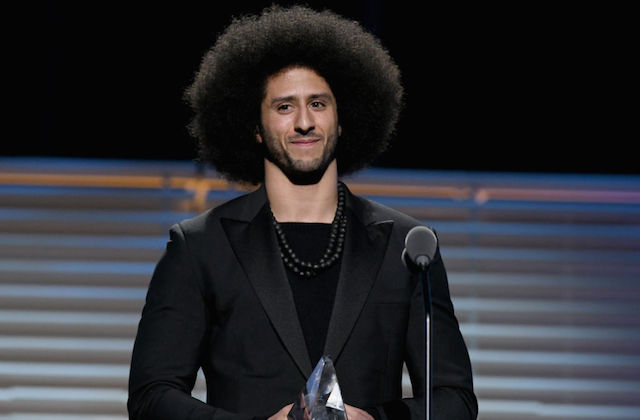3 Reasons the Philadelphia Eagles Should Hire Colin Kaepernick

Philadelphia Eagles fans should have spent Sunday night (December 10) celebrating the team’s 43-35 victory over the Los Angeles Rams, which made it the National Football Conference (NFC) East division champion. Instead, the loss of starting quarterback and team leader Carson Wentz to a torn ACL left Philadelphians wondering if the best-performing team in the NFC can make it through the playoffs:
Would have rather lost and Wentz been fine.
— Keiana (@RealMamaEagle) December 11, 2017
*lays down in bed, thinks of Carson Wentz* pic.twitter.com/Bi06MtGQ36
— Gym Shorts (@IgglesCoverage) December 12, 2017
The birds already have a qualified replacement in backup quarterback Nick Foles. Still, as CBS Sports speculates, Wentz’s injury opens the possibility for other available QBs to back Foles. CBS Sports puts Colin Kaepernick at the top of its shortlist for the job. Pro Football Hall of Famer and Fox Sports analyst Cris Carter tweeted his agreement with a mockup of Kaep in uniform:
Wentz is done for the year, so bring Kaepernick to Philly pic.twitter.com/ctPDtnP15z
— Cris Carter (@criscarter80) December 11, 2017
While the athlete and activist could reasonably back up any starting QB, as Seattle Seahawks coach Pete Carroll said back in June, Kaepernick deserves to start for a National Football League (NFL) team. But as Kaepernick proceeds with his collusion case against the league, here are three reasons why he would find a comfortable home in the City of Brotherly Love:
1.) He has the talent.
Kaep might need some time to adjust to a new team with weeks of wins under its belt, but the former Super Bowl contender has the skill necessary to excel. The Washington Post's ongoing analysis concludes that Kaepernick averaged more adjusted net yards per passing attempt—which evaluates the average number of yards a quarterback gains on each attempted pass—than 13 current starting NFL quarterbacks. Kaep’s former San Franscico 49ers teammate and supporter Eric Reid says that despite his free agency, Kaep is training hard to maintain his playing shape. The Eagles would benefit from Kaepernick’s skill in the QB position.
2.) He fits right in with Philadelphia’s Black activist legacy.
Black Philadelphians make up nearly half (44.2 percent) of the city’s population. They also play a significant role in the city’s racial justice struggle.
The past half-decade saw the Philadelphia Police Department wage war on groups like the local Black Panther Party and MOVE, the back-to-nature group that the department bombed in 1985. More recently, organizers leaned on law enforcement and city government in reaction to an allegedly violent rogue narcotics squad and the police killing of Brandon Tate-Brown. Last month, the city elected Larry Krasner—who successfully defended many Black activists arrested during protests against police violence—as its district attorney.
Kaepernick already boasts some familiarity with Philadelphia’s current struggles with systemic racism. He joined a number of Black sports and entertainment personalities in demanding justice for rapper Robert Rihmeek “Meek Mill” Williams, who faces two to four years in state prison for probation violations. Kaepernick tweeted the following statement of solidarity last month:
Spoke to Meek Mill & he wanted ppl to know regardless of his unjust situation, he’s in good spirits & humbled by the support the people have shown him. We'll continue to fight against the harsh sentencing practices that have affected Meek & millions of other POC for generations.
— Colin Kaepernick (@Kaepernick7) November 20, 2017
Black Philadelphians, who survive overt and subtle racism in everything from policing to workplace interactions, can benefit from the spotlight Kaepernick would shine on their resilience.
3.) He could work with Malcolm Jenkins to repair the fractured Players Coalition.
Eagles safety Malcolm Jenkins leads the activism-minded Players Coalition, which compelled NFL executives to donate nearly $90 million to player-supported grassroots causes. Jenkins uses this platform to support criminal justice reform, including legislation to end money bail practices in Pennsylvania.
But Jenkins’ alleged actions caused controversy that led to players like Reid leaving the coalition. Reid accused Jenkins of negotiating the league commitment without player input, lying about Kaepernick’s invitations to negotiations for advocacy support and diluting the anti-racist potency of Kaep’s original protests. Kaepernick, through his attorneys, leveled similar accusations against Jenkins. Meanwhile, Jenkins, has rejected these accusations, saying that Kaepernick has either declined or not responded to invitations to league negotiations.
Regardless of what actually happened behind the scenes, the fractured Players Coalition could be rebuilt if Jenkins and Kaepernick were forced to share a public stage. A reconciliation could bridge Kaepernick’s unapologetic resistance with Jenkins’ more incremental approach to reform and possibly push the NFL toward a strong commitment to criminal justice reform. Moreover, it could allow Eagles fans and anti-racist activists alike to channel the enthusiasm around the Eagles’ performance into meaningful change.
Colin Kaepernick doesn’t need the Eagles. But backup or not, Philadelphians who care about racial equity need him.
